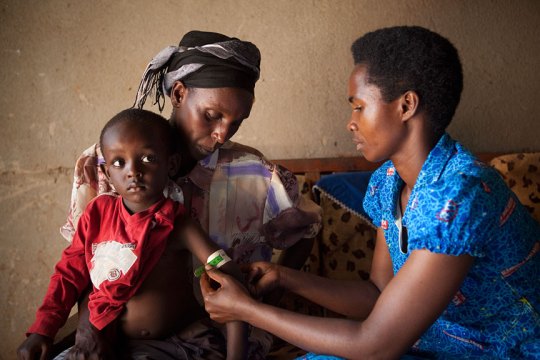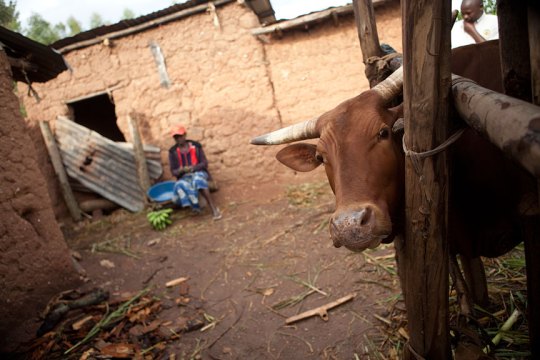Not many of us can claim to have saved 100,000 lives. I recently spent a week in Rwanda photographing jointly for the Gates Foundation and the Global Fund, two of the greatest change-makers in global health today. The Gates Foundation is a major contributor to the Global Fund to Fight AIDS, Malaria and Tuberculosis. Together they save an estimated 100,000 lives each month. Above, a child receives a polio vaccine in a public health center in Kabuga, Rwanda.
While health care is a controversial issue across the world, especially in US politics, we in the West might view it differently if were we dealing with the same epidemics people face in places like Sub-Saharan Africa. Here, UN, PEPFAR or Global Fund-supported public health centers are the primary means for accessing care for diseases such as tuberculosis and HIV. Treatment for such diseases would be far out of reach for most individuals were it not for donor agencies.
Above, community health care worker Angelique Uzamukunda (r) measures the diameter of four year old Elie’s arm with the help of his mother in order to monitor his nutrition levels. Angelique, also shown below walking along a roadside in the town of Rumyongza, monitors members of her community for signs of HIV, TB, malnutrition, and malaria, and makes referrals to local health centers when needed.
Prevention programs are also part of the Global Fund‘s strategy. Research shows a 60% decline in transmission of HIV from female to male after circumcision. The procedure is now in high demand since the Rwandan Ministry of Health has been offering it for free every Saturday. Below, Dr. Semana Cyrille talks with young men as they queue for circumcision operations at Kibagabaga Hospital in Kigali.
I’ve been in Africa long enough to remember a time when anti-retroviral therapy (ARV) was not available. As a volunteer at an orphanage in 2002, I recall one three-year old child dying on the first week of my arrival there. I’m hopeful that these days are in the past.
Above, Nutritionist Claudette Kayitesi counsels François Iyamuremye as he receives his monthly anti-retroviral medication at a clinic in Rwanda’s capital, Kigali. Nearly 100,000 people (seems to be a magic number) are supported with essential ARV medication by the Global Fund in Rwanda alone. Proper adherence to treatment and diet are an essential part of the ARV regimen. The medication is never unaccompanied by counseling.
Our team documented François and his family’s life for two days while in Rwanda. Both he and his wife are HIV positive. François also leads a class of HIV victims where he discusses adherence to the medication and ways patients can deal with stigma surrounding the virus in their communities.
3.3 million people are currently receiving ARV treatment through the Global Fund. Following the global financial crises, contributions to the fund from donor governments have been down. Isolationist rhetoric coming from some US presidential candidates is also troubling. Perhaps we should keep in mind that not all interference in the affairs of other nations need be for strategic political gain.
François’ wife Jacqueline, shown above, together with her husband, was diagnosed with HIV before the birth of their last child, Thierry. Shown below on right, with his sister Lyzette, Thierry’s status is negative thanks to Global Fund-supported Rwandan government programs. Jacqueline is determined for her children to remain HIV negative throughout their lifetimes and has begun to educate them about the disease even at their early age.














